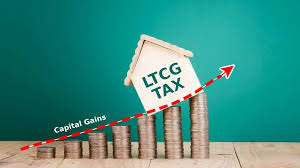Capital gains tax is levied whenever an individual earns a profit by selling capital assets such as residential plots, vehicles, stocks, bonds, and even collectables such as artwork.
It is primarily categorised into 2 types: Short-Term Capital Gains Tax and Long-Term Capital Gains Tax. Transactions involving any such capital asset are taxable under the Income Tax Act of India, as well as cess and any other surcharge that may be applicable on the sale.
These taxes apply on movable and immovable assets, including residential properties, vacant plots, and assets like shares (both equity and listed) debentures, units of Equity-Oriented Mutual Funds, Government Securities, UTI, Zero-Coupon Bonds, etc.

Tax on Long-term Capital Gain
In India, profits from the sale of assets held for more than 24 months are subject to long-term capital gains tax. The kind of asset and the relevant tax legislation determine the tax rate on long-term capital gains.
If long-term capital gains exceed INR 1 lakh, long-term capital gains tax is currently assessed on listed assets at a rate of 12.5%. However, long-term capital gains will not be subject to taxation if securities transaction tax (STT) was paid on the acquisition and sale of the securities.
The long-term capital gains tax rate for other assets, such as gold or real estate, is 12.5%, with an indexation advantage. This indicates that the asset’s purchase price, adjusted for inflation, determines the tax rate.
Assets | LTCG Tax Rate |
Equity Mutual Funds, Stocks | 12.5% |
Gold, Debt Funds, Miscellaneous Assets, Land, Flats, Real Estate | 12.5% |
After the Union Budget 2024, the proposed tax rate for listed securities is 12.5% without indexation.
Calculation of LTCG Tax
For the calculation of the Long Term Capital Gains (LTCG) tax, the tax is charged on the profit gained from the sale of an asset held for longer than 24 months.
The LTCG tax rate is determined by the asset type and the holding period.
In India, for example, the LTCG tax on equities, mutual funds and stocks is 12.5% if the profits reach Rs. 1.25 lakh in a fiscal year. The LTCG tax rate is 12.5% with an indexation advantage for other assets such as real estate, gold, and debt mutual funds.
To compute the LTCG tax, perform the following steps-
- Calculate the Asset’s Sell Value.
- Calculate the Cost of Acquisition.
- Calculate the Indexed Cost of Acquisition.
- Calculate the LTCG.
- Calculate the Tax.
Let’s assume you have invested Rs.40 lakh in equity funds in 2020. By 2024, your funds are collectively valued at Rs.55 lakh. Let’s look at the difference in the LTCG tax you are liable to pay prior and post the Union Budget 2024 announcement
Formula to calculate LTCG tax = Gains (minus) exemption amount * rate of tax
Here, gains are calculated by deducting the redemption amount deducted by investment amount.
From the above example, this would be Rs.55 lakh (minus) Rs.40 lakh = Rs.15 lakh
Previous LTCG @10%; (Exemption – Rs.1 lakh) – Regulation Before Union Budget 2024
(Gains – Rs.1 lakh)*10%.
Rs.15,00,000 – Rs.1,00,000)*10% = Rs.14,00,000*10% = Rs.1,40,000
New LTCG LTCG @ 12.5%; Exemption – Rs.1.25 lakh) – Regulation After Union Budget 2024
(Gains – Rs.1.25 lakh)*12.5%
(Rs.15,00,000 – 1,25,000)*12.5% = 13,75,000*12.5% = Rs.1,71,875
Exemptions on Long-Term Capital Gains Tax
Capital gains up to Rs 1.25 lakh per year (equity) are exempted from capital gains tax.
Long-term capital gain tax rate on equity investments/shares will continue to be charged at 12.5% on the gains. On the other hand, short-term capital gains tax on shares or equity investments will be charged at 15%.
Long-term Capital Gains Tax | On the sale of:
| Applicable Tax Rate: 12.5% over and above Rs 1.25 lakh
|
Others | Applicable Tax Rate: 12.5% |
FAQs
What is LTCG?
The assets owned by an individual that may or may not be connected with business or profession are called capital assets. The common examples of capital assets include bonds, mutual funds, jewellery, patents, or trademarks. However, furniture and clothes for personal use, rural agricultural land are not capital assets.
The LTCG or long-term capital gains tax is charged on the profit generated from an asset such as shares, bonds, commodities, or real estate that is held for the long-term. The period of holding, which is ‘short term’ or ‘long term’ differs across various assets. It is defined as per the Income Tax Act, 1961.
What is an LTCG Calculator (Long Term Capital Gains Tax Calculator)?
The long-term capital gains or LTCG Calculator is a utility tool, which shows you the long-term capital gains and the LTCG tax liability, for equity-oriented mutual funds and listed equity shares.
The LTCG Calculator consists of a formula box, where you enter the holding period, the purchase value, and the sale value of the equity-oriented fund. The calculator will display the taxable short-term capital gain or long-term capital gain, depending on the holding period.